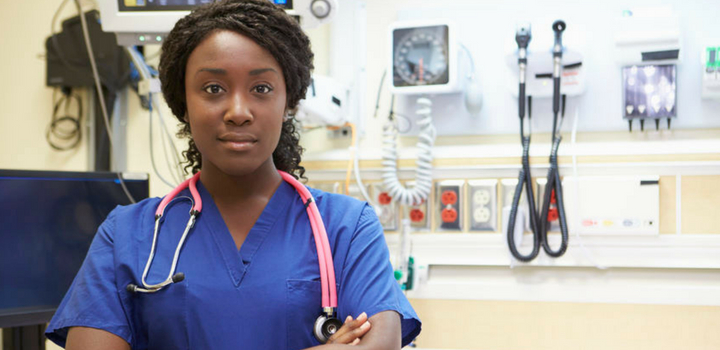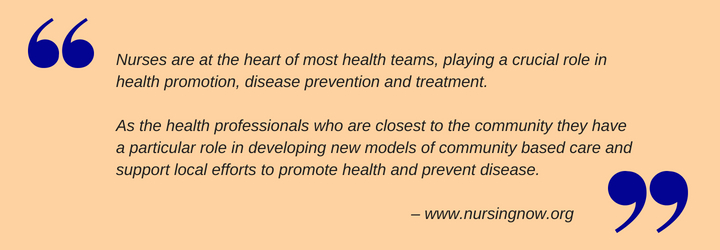- The very real benefits of a dedicated NHS account manager
- Team Focus | Hugo Mellouli, Head of Sales, Europe
- Introducing SANIBOX®: Enhancing our sustainable clinical waste containment solutions
- Reducing Glove Usage – A New Collaborative Solution
- Manufacturing milestones, sustainability success, and new beginnings
Posted on by
Our NHS Nurses and Universal Health Coverage

Here at Daniels we work really closely with our NHS customers, and a large majority of those are nurses, infection prevention professionals, midwives and other clinical specialists. The issues that affect them on a day-to-day basis affect us, as we continue to support them in their changing working environments.
As you will already know we have a great relationship with the #WeCommunities team of Teresa and Nick Chinn. We work together with them to raise awareness of the challenges of the nursing and medical profession as a whole – as well as lift up the great stories of fantastic people who do such important work.
By knowing and working with these communities, we like to stay on top of the more global issues facing this sector.
Universal Health Coverage (UHC)
At the UN General Assembly in Sept 2015, we (the UK) and other nations signed up to the ambitious goal of the now much talked about: Universal Health Coverage (UHC). The basic belief they are committing to is “that everyone, everywhere, should have the right to receive the quality health services they need without suffering financial hardship.”
As the RCN rightly notes: nurses and midwives constitute the greatest proportion of the global health workforce and have a key role to play in the achievement of UHC. This is certainly true for the UK and our NHS.
How to achieve UHC
There is a lot going on in our world today that impacts the ability for this vision to be achieved – a growing population, technological advances, staffing, costs and out-dated ways of doing things (to name a few).
Many of these challenges are affecting front-line staff who are under much moral distress – they want to provide the care they know they need to, but they are just not able to. (You only have to watch the news or walk into a hospital in the UK to hear stories of nurses under pressure).
The World Health Organisation has developed a framework to address these growing challenges and give member nations the tools to look at an integrated, people-centred health service. (Instead of bending the people/patients/staff to fit the historical systems in place – which were built in a very different time in healthcare.)
“(This WHO) framework serves as a guide for national governments, provider organisations, communities and system leaders to design, organise and deliver care to better meet people’s needs.” – taken from NHS blog post “The Impact of Nursing and Midwifery around the world”.
A people-centred health solution
What is clear from what the WHO is saying and including in their programme of work, (which they put forward for approval by member nations at their World Health Assembly in May 2018), is this:
- Around the world, health systems are increasingly stretched (increased patient demand, dropping staffing figures, out-dated systems)
- There are system constraints which are common nation to nation:
- Fragmented, inherited models of service delivery
- Care focussed on cure
- Lack of staff engagement
- Low empowerment of people and communities in exercising self healthcare
- Insufficient and misaligned funding
The WHO’s framework faces the facts head-on, and recognises that for healthcare to be truly universal, relevant and responsive to the changing world, a critical shift is needed.
We need to move towards systems that are built around people (and not singular diseases). People-centred health service delivery reforms are critical to addressing 21st century health system challenges, and to achieving the goal of Universal Health Coverage.
What are our nurses doing now?
Well, I am really pleased to say that we can feel the bubble of the power of the voices from the front-line being heard. And action is being taken!
Newly launched Nursing Now, is a collaboration between the WHO and the International Council of Nurses, with the Duchess of Cambridge as their patron. It is a 3-year long campaign to bring awareness to the part that nurses play in achieving UHC.

“Nurses are at the heart of most health teams, playing a crucial role in health promotion, disease prevention and treatment. As the health professionals who are closest to the community they have a particular role in developing new models of community based care and support local efforts to promote health and prevent disease.” – www.nursingnow.org
We can also see, through our collaboration with WeCommunities, and looking at campaigns like #FabChangeWeek – there are efforts to build in opportunities for front-line staff to help bring about the mindset and system shift needed to achieve UHC. A great result from this will be about engaging staff in the process.
I, for one, look forward to hearing more great stories of changes and also look for ways in which Daniels can use their social media audiences and relationships to better raise awareness for all the great work that nurses are doing.








